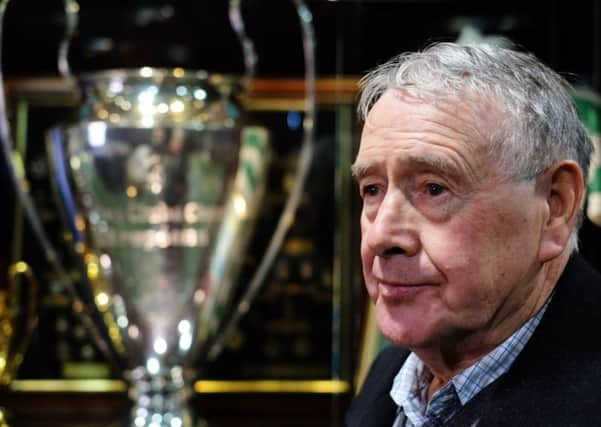Lisbon 1967: The Celtic pilgrimage no fan could miss


It was the biggest day of fans’ lives, pushing weddings into second place, with one supporter informing his bride-to-be: “See this getting married carry-on? Buying a ring and that? I need to go to the final… ”
And nothing was going to stop the charge to Lisbon, not even suitcases falling off roof-racks amid the convoy of old bangers or pretty waitresses en route convincing the faithful they were in love. “She wanted my scarf,” recalls one fan of a romantic interlude in France. “I need it,’ I said.”
Advertisement
Hide AdAdvertisement
Hide AdBut if the travel arrangements of the green-and-white hordes were compromising and chaotic, Jock Stein had been methodical in his preparations for the 1967 European Cup final, leaving nothing to chance. The club brought their own steaks and chops, and being from Glasgow, their own square sausage, too.
Scottish football’s apotheosis when Celtic became the first British team to win the trophy is celebrated in a documentary to be screened next week on the eve of the 50th anniversary of the triumph and for completists who maybe reckoned they had seen every image from the run to glory there are some nice surprises.
Captain Billy McNeill packed a cine camera on an American tour the previous summer. That trek was important in preparing the team for greatness but until now the flickering film of the players’ sightseeing and larking about on the beach, when Jimmy Johnstone and Bobby Lennox sang Pretty Flamingo ad nauseum, had been hidden in an attic.
There’s even more jittery footage of McNeill’s quarter-final winner against Vojvodina, a goal presumed lost because it is missing from the surviving TV coverage. Still photos of a Yugoslav outfield player desperately trying to palm away a last-minute header travelling as fast as a shot had only served to enhance the goal’s mythical status. Now, thanks to the fan who aimed a cine camera at his TV set, we can all marvel at its power.
Some of the clips are familiar. In 1972 my father, the BBC Scotland producer W. Gordon Smith, made a film to mark the SFA’s centenary called Bring Your Own Ball and excerpts from it, especially the moment when he asked Stein “Are you a disciplinarian?”, turn up almost every time TV celebrates the golden era in our game. Here Lennox supplies the example of the manager’s hard-line style, in this case the dim view taken of the presence of his players’ other halves: “He’d go: ‘Does a plumber’s wife watch him unblock a sink? Does a joiner’s wife watch him put up a cupboard?’ ”
Johnstone’s widow Agnes seemed to follow Big Jock’s rule to the letter. Jinky’s wing wizardry had prompted second-round opponents Nantes to concede that tackling him was like “trying to pin a wave to the sand”, and yet Agnes only ever watched him in the flesh on a handful of occasions. Bobby Murdoch’s widow Kathleen recalls: “She made us laugh when she’d ask: ‘Which team’s which and which one’s Jimmy?’ ”
Before the journey to Lisbon, some of the key personnel had highly dramatic journeys just to get to Parkhead. When Stein was reserve coach he was told by chairman Sir Robert Kelly that as a non-Catholic he had “gone as far as he could” at the club. This prompted a tearful response, but at Dunfermline Athletic and Hibernian Stein showed he was a good manager, en route to his return to the East End of Glasgow and becoming a great one.
John Clark suffered tragedy as a boy when his father was killed working on the railways while Lennox had to overcome crippling shyness. The young Stevie Chalmers, meanwhile, was mere days from succumbing to tuberculosis meningitis until his doctor tried out a new drug in the increasingly desperate fight against what the documentary calls “Glasgow’s biggest killer”. The treatment worked and Chalmers would later write to his saviour: “My success is your success and I must very humbly say: ‘Thank you’.” Thousands would echo the player’s words because, of course, Chalmers scored the winner against Inter Milan.
Advertisement
Hide AdAdvertisement
Hide AdIn ’67 Celtic launched football’s first newspaper, the Celtic View, which featured adverts for club-endorsed cigarettes and coverage of the “Miss Celtic” beauty pageant. More significantly they launched a brand of attacking football in stark contrast to catenaccio. As Archie Macpherson remarked during commentary, they weren’t just trying to beat Inter but “end the ice age of defensive European football”.
As an event this had to be seen and a Glasgow priest, Father Thomas Hendry, recalls how cup mania spread to the pulpits. “You couldn’t get a seat on a plane to Lisbon for love not money,” he says. Then a fellow priest discovered that a popular magazine was offering a flight, the only trouble being it was the “soft-porn” Titbits.
No matter, this was the final of football’s greatest club competition. “Then no sooner had the plane taken off from Glasgow,” laughs Fr Hendry, “than it landed at Cardiff to pick up… alcohol!”
l Glasgow 1967: the Lisbon Lions, BBC One Scotland, 24 May, 9pm